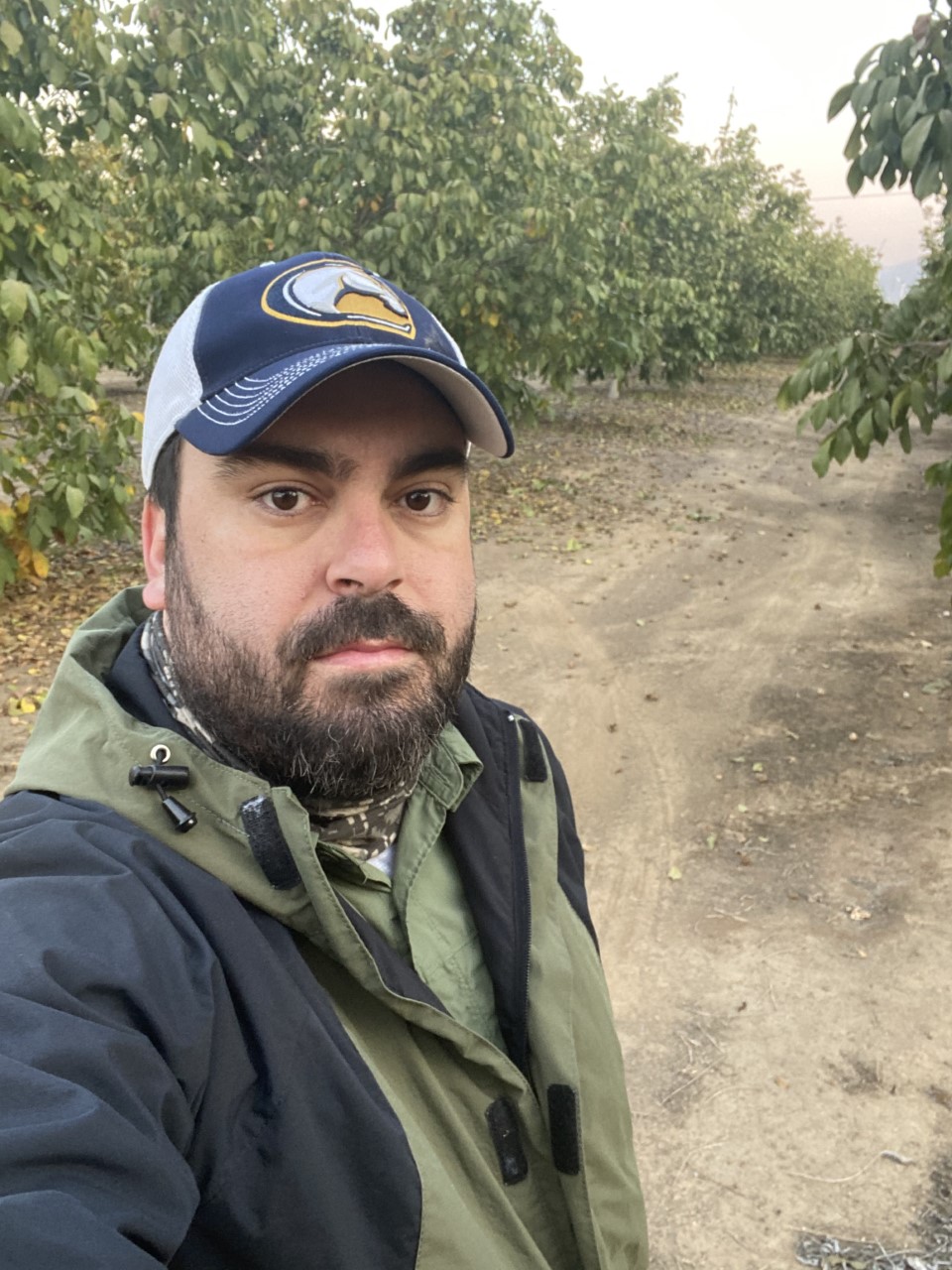
Douglas Amaral joined UCCE in October as a new Pomology and Water/Soils Area Advisor in Kings and Tulare counties. Amaral, who earned his Master’s degree in Plant Nutrition and Soil Fertility from the Federal University of Lavras, Brazil and a dual Ph.D. in Plant and Soil Sciences from the University of Delaware and Federal University of Lavras, brings an array of soil and water expertise to the table.
“I grew up in a farm environment. My grandpa, dad, uncles and cousins were all farmers,” Amaral said. “I was not only interested in growing crops and making profit out of it, but also trying to understand how things worked and how proper crop management could improve production and reduce costs.”
In his new role with UCCE, Amaral will focus on tree nut crops (almond, pistachio and walnut) in Kings County, almond production in Tulare County and plant-water-soil interactions for permanent tree and vine crops in both counties.
“I am excited about this new opportunity to work closely with growers and the industry and help them improve their agricultural practices through research and extension,” Amaral said.
Research Experience
Before joining UCCE as a farm advisor, Amaral had worked closely with UC faculty, UCCE specialists, UCCE advisors and farmers as a postdoctoral researcher and project scientist at UC Davis since April 2017. His research focused on the evaluation of physiology and biochemistry of plant nutrient uptake as well as soil fertility management for mitigating nutrient input loss and improving crop productivity.
“The main focus was on improving nitrogen management in tree crops,” Amaral said. “But why N? Usually, less than half of the applied nitrogen is utilized by the crops and the rest is lost to the environment, causing contamination of the groundwater.”
According to Amaral, to regulate water discharges from ag operations, the Irrigated Lands Regulatory Program implemented a program where every grower is required to apply adequate, but not excessive, amounts of N so production is optimized and loss to the environment is reduced.
“There is a growing pressure for all ag to ‘improve’ the efficiency of nitrogen use, and it will require an improved understanding of nitrogen demand to grow tree crops,” he said.
Amaral’s research also aimed to develop an outreach program with the objective of informing farmers, stakeholders and government agencies and to also create guidelines that will help in the development of best management practices to maintain sustainability of crop production and environmental stewardship.
“We believe that a better understanding of all different nitrogen sources and how nitrogen can be “lost” in the system will help growers better make management decisions,” he said.
Amaral believes the research he conducted at UC Davis has helped to improve the industry and its practices.
“Our research, in collaboration with Dr. Patrick Brown from UC Davis and group, has helped growers implement Best Management Practices for different crops like almonds, pistachios and citrus among others through seminars, field days and publications,” he said.
Growers can now use the results from this research to what he calls “TRAP” (time, resources, amount and place) N in the soil: Time N applications according to tree uptake patterns; make use of the best resources (fertilizers, compost, manure, cover crops and irrigation water) to improve efficiency; apply the amount needed according to tree demand; and place N in the active root zone to avoid loss to the environment, according to Amaral.
Current Work
In his new role as a Pomology and Water/Soils Area Advisor, Amaral will work and collaborate with pomology and permanent crops advisors in the southern San Joaquin Valley to develop an integrated and complimentary research and extension program that addresses critical local needs. Numerous research needs exist in the tree nut industries in Kings and Tulare counties, including, but not limited to, irrigation and fertigation efficiency, salinity management and water use improvement, according to Amaral. Currently, though, Amaral is focused on meeting growers and assessing their needs first.
“It has been a little difficult because of the pandemic, but my goal is to reach out directly to growers, the industry and commodity boards through surveys and during presentations or field days,” he said.
Amaral said that the most relevant scientific inquiries start with observations of the challenges faced in the field, the opinions of observant growers and the vision of industry leaders.
Amaral’s experience in plant science research along with his background in plant nutrition and orchard management provide a strong foundation for addressing issues related to nut crop production in agricultural systems and the environment. Overall, he aims to optimize crop yield and nutrient management techniques preserving both the environment and natural resources in Kings and Tulare counties and throughout the Southern San Joaquin Valley.
Doug Amaral is based at the UCCE Kings County Office in Hanford and can be reached at (559) 852-2737 and amaral@ucanr.edu.















